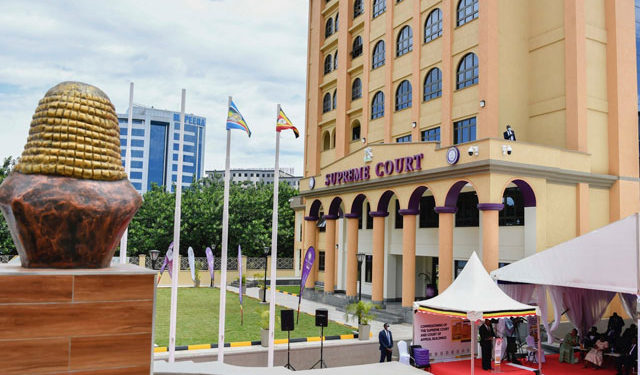Uganda’s Judiciary stands on the brink of a historic transformation, heralding a new era of accessibility, efficiency, and fiscal responsibility with the inauguration of the Twin Towers – home to the Supreme Court and Court of Appeal. These architectural marvels represent more than mere buildings; they symbolize a paradigm shift towards a justice system that serves all citizens equitably. Chief Justice Alfonse Owiny Dollo’s declaration of relief at the unveiling of the Twin Towers underscores a monumental leap towards financial liberation, as the burden of exorbitant rent payments has long hampered the Judiciary’s ability to fulfill its mandate effectively.
Drawing parallels with successful cost-saving initiatives in other nations, such as Malaysia’s establishment of purpose-built court complexes, demonstrates how strategic infrastructure investments can alleviate financial strain while enhancing administrative efficiency. Moreover, the Judiciary’s commitment to decentralization through the establishment of 38 High Court circuits exemplifies a profound dedication to making justice accessible to all Ugandans, regardless of geographical location.
Comparative analysis with countries like South Africa, where the introduction of mobile courts has bridged the gap between urban centers and remote communities, highlights the transformative potential of innovative judicial outreach strategies. Chief Justice Dollo’s call for increased budgetary allocation reflects a crucial step towards ensuring the sustainability and expansion of Uganda’s justice system. With President Museveni’s pledge to bolster the Judiciary’s budget, there exists a tangible opportunity to fortify institutional capacity and address pressing infrastructure needs.
Examining success stories from jurisdictions like the United Kingdom, where strategic investments in courthouse modernization have yielded significant returns in terms of efficiency and public trust, reinforces the importance of adequate funding for judicial reform initiatives. Despite the strides made with the Twin Towers, challenges persist in ensuring that all court divisions have permanent residences. The plight of divisions operating from rented spaces underscores the ongoing need for comprehensive infrastructure development.
By emphasizing the broader societal implications of a robust justice system, including its role in fostering social cohesion, economic development, and the protection of fundamental rights, this analysis seeks to garner widespread support for the Judiciary’s quest for inclusive justice. As the Supreme and Appeal Courts celebrate their new home, Uganda’s Judiciary stands poised to realize its vision of delivering justice for all.
With unwavering dedication to expansion and innovation, coupled with the support of government and citizens alike, the future of Ugandan justice gleams brighter than ever before. Through ongoing public engagement, transparency, and accountability measures, the Judiciary can cultivate a culture of trust and confidence among Ugandans, ensuring that the pillars of progress remain steadfast in the pursuit of a fair and equitable legal system.
The journey towards a more just and inclusive society requires steadfast commitment, visionary leadership, and unwavering support. As Uganda’s Judiciary embarks on this transformative path, let us rally behind the towers of justice, championing accessibility, efficiency, and fiscal responsibility. Together, we can build a future where justice truly finds a home for all.







Discussion about this post